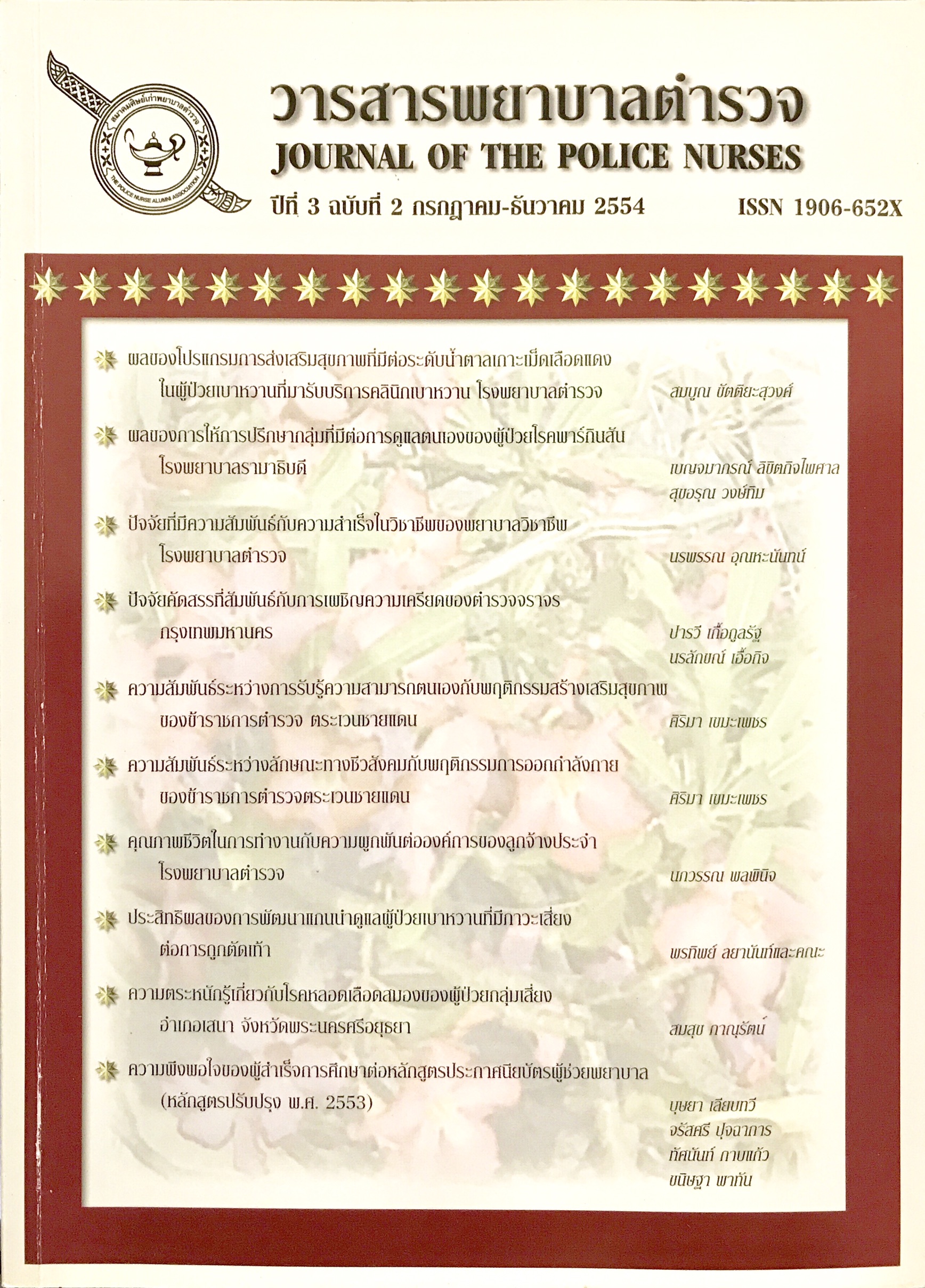ความสัมพันธ์ระหว่างการรับรู้ความสามารถตนเองกับพฤติกรรมสร้างเสริมสุขภาพ ของข้าราชการตำรวจตระเวนชายแดน
Keywords:
การรับรู้ความสามารถตนเอง, พฤติกรรมสร้างเสริมสุขภาพ, self-efficacy, health promotion behaviorAbstract
บทคัดย่อ
ปัจจุบันการเจ็บป่วยและการเสียชีวิตส่วนใหญ่เกิดจากโรคไม่ติดเชื้อ ได้แก่ โรคหัวใจและหลอดเลือด ระดับไขมันในกระแสเลือดสูง โรคเบาหวาน ความดันโลหิตสูง โรคอ้วน ถุงลมโป่งพอง โรคเกี่ยวกับสุขภาพจิต และมะเร็ง เป็นต้น ข้าราชการตำรวจเป็นกลุ่มเสี่ยงต่อการเจ็บป่วยด้วยโรคดังกล่าว พัฒนาการดูแลสุขภาพในปัจจุบันจึงเน้นการสร้างเสริมสุขภาพ ดังนั้น ในการศึกษาครั้งนี้มีวัตถุประสงค์เพื่อศึกษาความสัมพันธ์ระหว่างการรับรู้ความสามารถตนเองกับพฤติกรรมสร้างเสริมสุขภาพของข้าราชการตำรวจตระเวนชายแดน กลุ่มตัวอย่าง ได้แก่ ข้าราชการตำรวจตระเวนชายแดน จำนวน 389 คน ที่เข้าอบรมตามโครงการตำรวจไทยไร้พุง คัดเลือกแบบเจาะจง (Purposive sampling) และความสมัครใจในการให้ข้อมูลตามแบบสอบถาม เครื่องมือในการเก็บข้อมูลครั้งนี้ ได้แก่ แบบสอบถาม เครื่องชั่งนํ้าหนัก สายวัดรอบเอว และเครื่องวัดความดันโลหิตแบบดิจิตอล การเก็บข้อมูลดำเนินการก่อนการเข้ารับการอบรมโดยให้ผู้เข้ารับการอบรมตอบแบบสอบถามด้วยตนเอง การชั่งนํ้าหนัก วัดรอบเอว และวัดความดันโลหิต ผู้วิจัยดำเนินการร่วมกับเจ้าหน้าที่โครงการ การพรรณนาข้อมูลใช้สถิติ ร้อยละ ค่าเฉลี่ย ค่าเบี่ยงเบนมาตรฐาน การหาความสัมพันธ์ใช้ค่าสัมประสิทธิ์สหสัมพันธ์ของเพียร์สัน ที่ระดับนัยสำคัญทางสถิติ <0.05 ผลการศึกษา พบว่า ข้าราชการตำรวจร้อยละ 88.92 มีคะแนนการรับรู้ความสามารถของตนเอง และร้อยละ 95.63 มีคะแนนความคาดหวังในผลลัพธ์ของการปฏิบัติในระดับสูง จากการศึกษาพฤติกรรมสร้างเสริมสุขภาพแยกรายด้าน พบว่าข้าราชการตำรวจมีคะแนนพฤติกรรมการออกกำลังกาย พฤติกรรมการบริโภคอาหาร และพฤติกรรมการจัดการความเครียด อยู่ในระดับพอใช้ ร้อยละ 89.97 86.12 และ 83.76 ตามลำดับ นอกจากนี้พบว่า การรับรู้ความสามารถของตนเองมีความสัมพันธ์ทางบวกกับพฤติกรรมการออกกำลังกายอย่างมีนัยสำคัญทางสถิติ (r=0.28 p<0.01) และมีความสัมพันธ์ทางบวกกับพฤติกรรมการบริโภคอาหาร และพฤติกรรมการจัดการความเครียดอย่างมีนัยสำคัญทางสถิติ (r=0.22, 0.10 ตามลำดับ p<0.01) ความคาดหวังในผลลัพธ์ของการปฏิบัติมีความสัมพันธ์ทางบวกกับพฤติกรรมการออกกำลังกายอย่างมีนัยสำคัญทางสถิติ (r=0.18 p<0.01) แต่ไม่มีความสัมพันธ์ทางสถิติกับพฤติกรรมการบริโภคอาหาร และพฤติกรรมการจัดการความเครียด ดังนั้น จึงควรส่งเสริมให้ข้าราชการตำรวจมีการดูแลสุขภาพตนเองอย่างต่อเนื่อง และเหมาะสม เพื่อการมีสุขภาพที่ดี สำหรับการศึกษาครั้งต่อไปควรศึกษาแบบกึ่งทดลองเพื่อหารูปแบบการส่งเสริมพฤติกรรมสร้างเสริมสุขภาพที่เหมาะสมและยั่งยืน
The Correlation between Self-efficacy and Health Promotion Behavior among Border Patrol Police
Abstract
Currently, the major causes of morbidity and mortality are non-communicable diseases, for example, cardiovascular diseases, dyslipidemia, diabetes mellitus, hypertension, obesity, chronic obstructive pulmonary disease, mental disorder and cancer. All of these can be found among police personnel. In order to reduce the incidence of these diseases, health promotion is emphasized for primary health care. The purpose of this study was to investigate the correlation between self-efficacy and health promotion behavior among police personnel. The participants of the current study were 389 police personnel who participated in the Thai police anti-obesity project. Purposive sampling technique was used to recruit volunteer subjects. Questionnaire, scales, waist circumference tape and digital sphygmomanometer were used to collect data such as weight, waist circumference, and blood pressure. Percentage, mean and standard deviation were performed to analyze the data. Pearson’s product moment correlation coefficient was employed to determine the correlation between self-efficacy and health promotion behavior. The statistical difference was less than .05. It was found that 88.92%, and 95.63% of police personnel had positive high level scores for self-efficacy and outcome expectation. Health promotion behavior scores including exercise, consumption and stress management were at the positive fairly good level at 89.97%, 86.12%, and 83.76% of police personnel respectively. There were statistical differences at the positive between self-efficacy and exercise (r=0.28, p<.01) and at the positive between self-efficacy and consumption as well as stress management (r=0.22, 0.10 respectively, p<0.01). There was a significant difference at the positive between outcome expectation and exercise (r=0.18, p<0.01), while there were no significant differences between outcome expectation and the other factors. Our data indicates that health promotion modality should be enhanced continuously among police officials. Quasi-experimental research design, particularly for sustainable health promotion behavior, requires further study.
Downloads
Downloads
How to Cite
Issue
Section
License
ผลงานที่ได้ตีพิมพ์แล้วจะเป็นลิขสิทธิ์ของวารสารพยาบาลตำรวจ















